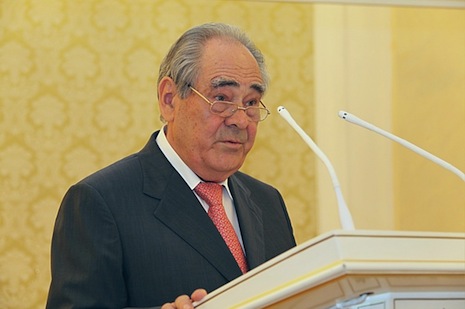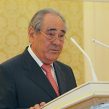
Shaimiyev Criticizes Moscow for Seeking Return to Pre-Perestroika Relations
Publication: Eurasia Daily Monitor Volume: 9 Issue: 203
By:

Mintimir Shaimiyev, the former president of Tatarstan whose views both reflect and help power the ideas of other non-Russian leaders, has issued a sweeping indictment of the current central Russian government for continuing to be in thrall to “a nostalgia for imperial thinking,” for seeking to return to “pre-perestroika” relations between the center and the periphery, and for failing to respect the constitutionally-mandated status of the non-Russian republics within the Russian Federation.
Speaking to an international conference in Kazan last Friday concerning “The Establishment of a New Federative Russia: The Legislative Experience of the Republic of Tatarstan,” Shaimiyev—who since retirement as president has served as a counselor to his successor—issued one of his sharpest critiques yet of Moscow’s policies under Vladimir Putin, saying that he was “categorically against the further centralization of the Russian state” and that he remains convinced that federalism is “the only possible path for the democratic development of the country” (www.interfax-russia.ru/Povoljie/news.asp?id=357714&sec=1671).
In addition, the Tatarstani leader used this meeting, timed to correspond to the 20th anniversary of the adoption of the Tatarstan Constitution, to criticize Moscow for failing to denounce the slogan of the Russian March, “Russia for the [Ethnic] Russians,” for not observing the rights of all peoples to preserve their native languages, for failing to maintain a clear separation of church and state, and for directly interfering in the administration of the republics. All this, as Ekho Moskvy summarized his remarks, “is undermining trust in the general and to the highest legislative power in particular” (https://www.echo.msk.ru/blog/echomsk/947362-echo/).
Because Shaimiyev’s specific words are likely to inform the thoughts and actions of the leaders of all the non-Russian republics within the Russian Federation, and because they thus represent the broadest non-Russian challenge to Moscow since the 1990s, they are worth citing in detail.
Shaimiyev began by saying that the Russian Constitution’s provisions for a clear division of powers between the center and the republics was “a breakthrough in the political life of the new perestroika society.” But unfortunately, he continued, “not only fractions of opposition parties but even deputies of [the ruling] United Russia Party for which,” the Tatarstan leader said, “we still are voting for, have not been able to free themselves from nostalgia of imperial thinking.”
Moreover, he continued, “in spite of constitutional norms,” which specify that “‘the unique source of power in the Russian Federation is its multi-national people,’ we do not hear an official condemnation by the institutions of power of calls like ‘Russia for the [Ethnic] Russians.’” And citizens of the Russian Federation do not see the powers that be in Moscow observing the constitutional requirement that “religious organizations are separate from the state and equal before the law.”
Another constitutional provision that Moscow is now ignoring, Shaimiyev continued, is the right “of the peoples of the country to preserve their native languages, to create conditions for their study and development.” Indeed, it is now the case, the Tatarstan leader specified, that “certain federal structures are adopting educational standards that in part limit the rights of the peoples to the study of their native languages.”
Obviously, Shaimiyev went on to say, “the problem of nationality questions is objectively present in our state and requires a well-thought-out resolution” by the powers that be. It “must not close its eyes to this.” But “unfortunately, one cites numerous examples of the adoption of federal laws” that reflect Moscow’s excessive use of power and that “undermine trust in the representatives of the Federal Assembly and in the final analysis to the highest legislative power” of the state.
Shaimiyev gave as an example the December 2010 law directing that heads of republics could no longer be called president. Similar legislation was introduced but rejected in 2001 and 2005, the Tatarstan leader pointed out, and he asked rhetorically, “What has changed since then? Have we become less attached to observing the Basic Law of the Russian Federation?” (www.interfax-russia.ru/Povoljie/news.asp?id=357714&sec=1671).
Shaimiyev clearly implied that it was not the republics but the central government that is violating the constitution, a very serious matter, he suggested, because “observing the Russian Constitution by all power structures” is “a guarantee of stability and necessary for the establishment of a genuine democratic federation.” Those who do not understand that, he implicitly suggested, are playing a most dangerous game, a game that they will almost certainly lose (www.interfax-russia.ru/Povoljie/news.asp?id=357714&sec=1671).
In coming days, at least some non-Russian leaders will be forced to distance themselves from Shaimiyev’s programmatic critique, most likely beginning with Chechnya’s pro-Kremlin leader Ramzan Kadyrov. But many others will clearly be thinking about following Shaimiyev. And that is something Moscow will have to worry about and something that those who deal with Russia need to take into consideration in their development of relations with Moscow and with the republics.




